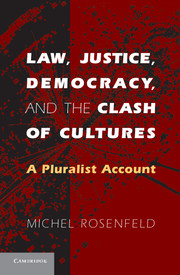Book contents
- Frontmatter
- Contents
- Introduction
- Part I Liberal Justice and Fleeting Specters of Unity
- Part II E Pluribus Unum?
- Part III Can Pluralism Thrive in Times of Stress?
- 7 Rethinking Political Rights in Times of Stress
- 8 Derrida’s Deconstructive Ethics of Difference Confronts Global Terrorism
- 9 Habermas’s Discourse Ethics of Identity and Global Terror
- 10 Conclusion
- Bibliography
- Index
7 - Rethinking Political Rights in Times of Stress
Can Pluralism Thwart the Progression from Stress to Crisis?
from Part III - Can Pluralism Thrive in Times of Stress?
Published online by Cambridge University Press: 05 June 2012
- Frontmatter
- Contents
- Introduction
- Part I Liberal Justice and Fleeting Specters of Unity
- Part II E Pluribus Unum?
- Part III Can Pluralism Thrive in Times of Stress?
- 7 Rethinking Political Rights in Times of Stress
- 8 Derrida’s Deconstructive Ethics of Difference Confronts Global Terrorism
- 9 Habermas’s Discourse Ethics of Identity and Global Terror
- 10 Conclusion
- Bibliography
- Index
Summary
Just as most theories of distributive justice presuppose conditions of moderate scarcity, comprehensive pluralism must count on a certain degree of openness between self and other. Where there is total or near total closure between self and other, as in an imagined fight to the death between global market libertarian capitalists and jihadist religious fundamentalists bent on global terror, there is simply no room for pluralism. Both of the two ideologies at stake in this last example are presumably irreducibly anti-pluralistic, and the war of cultures that they would engender and fuel would leave no room for a pluralist ethos. There may also be little room for pluralism under times of crisis where a polity is confronting a life-threatening emergency, such as a foreign military invasion. In such a case, all those within the attacked polity must close ranks and focus on what they share in common while for the most part ignoring what may differentiate or divide them.
It is obvious that when self and other are bent on mutual elimination, there is no room for pluralism. Furthermore, as already indicated, a pluralist polity cannot countenance religious fundamentalists fixated on forcefully converting or killing the infidel, through crusades, global terrorism, or otherwise. What seems much more puzzling, however, and will be the primary focus of this chapter and of the next two is whether there is room for pluralism, or whether the scope of pluralism must significantly retreat, in the face of an anti-pluralist assault, such as that triggered by global terrorism against those otherwise accustomed to a fair degree of openness between self and other. Significantly in this respect, the September 11, 2001, terrorist attacks on the United States and their aftermath leading to the United States’ “war on terror” did not pose an existential threat comparable to that justifiably dreaded in the face of a plausible nuclear confrontation with the Soviet Union during the Cold War. Nevertheless, following the September 11 attacks, the United States set to restrict civil liberties and to narrow the scope of tolerance in the pursuit of greater security through, among other things, the adoption of the Patriot Act, the creation of military commissions to circumvent key protections afforded criminal defendants in civilian tribunals, and the deployment of massive surveillance largely without judicial oversight. Similarly, other countries, such as the United Kingdom also adopted extraordinary measures, such as derogating from the protection of certain rights under ECHR.
- Type
- Chapter
- Information
- Law, Justice, Democracy, and the Clash of CulturesA Pluralist Account, pp. 211 - 250Publisher: Cambridge University PressPrint publication year: 2011



